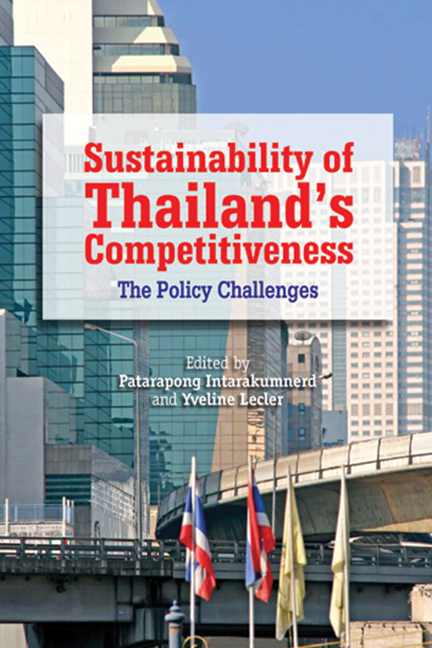Book contents
- Frontmatter
- Contents
- Preface
- Abbreviations
- Contributors
- Introduction
- Part I Thailand's Industrial Development: General Views
- 1 FDI in Thailand: The High Road to Industrial Diversification Revisited
- 2 Catching Up or Falling Behind: Thailand's Industrial Development from the National Innovation System Perspective
- 3 Industrial Upgrading and Educational Upgrading: Two Critical Issues for Thailand
- Part II The Roles of Institutions: Clusters and Industrial Estates
- Part III Firms and Government New Initiatives: The Industry Analysis
- Index
1 - FDI in Thailand: The High Road to Industrial Diversification Revisited
from Part I - Thailand's Industrial Development: General Views
Published online by Cambridge University Press: 21 October 2015
- Frontmatter
- Contents
- Preface
- Abbreviations
- Contributors
- Introduction
- Part I Thailand's Industrial Development: General Views
- 1 FDI in Thailand: The High Road to Industrial Diversification Revisited
- 2 Catching Up or Falling Behind: Thailand's Industrial Development from the National Innovation System Perspective
- 3 Industrial Upgrading and Educational Upgrading: Two Critical Issues for Thailand
- Part II The Roles of Institutions: Clusters and Industrial Estates
- Part III Firms and Government New Initiatives: The Industry Analysis
- Index
Summary
INTRODUCTION
This chapter will consider the relationship between the development process and the diversification of activities induced by foreign direct investment (or FDI) over the past five decades of industrialization. Our analysis will emphasize the interaction between growth, the international opening up of the economy, and public promotion policies. It will consider the regional context for FDI attractiveness in the ASEAN area, the impact of FDI on industrial development, and sector diversification through empirical data and policy analysis. Three phases will be defined, based on industrialization dynamics and growth patterns: First the founding decades (1959–85), then the period of FDI take-off-cum-export-led growth (1986–96), and finally, the crisis years and the post-crisis period since 1997. The conclusion, considering the situation in the present decade, addresses the issue of the “uncertainty of FDI”: Inflows remain strong amid a challenging regional and domestic environment but China's position in the regional arena both as a large market for inputs produced by neighbours, and as a recipient of FDI more than a significant investor — is ambivalent. Meanwhile competition from neighbouring ASEAN member countries is on the increase, and public policies look both erratic and lacking in consistency. Thailand's competitive advantage is indeed at stake and the reconstruction of this is a major challenge.
GROWTH AND INDUSTRIALIZATION
Thailand's growth pattern over the past decades is well analysed in economic literature, with major contributions from political economists (Hewison, Pongpaichit), mainstream economists (Warr, Krongkaew), and others (Simon, Suehiro). Thailand's case was also considered relevant in the controversial World Bank report on Asian Miracle economies (World Bank 1993). Thailand's industrialization is indeed a very good example of long-term growth-cum-development, a stage-based process sustained through time, with a strong transition of economic structures. Figure 1.1 offers an overview of this industrialization process — with three phases identified through three decades of development: 1970–85 when industry equals, then overtakes, agriculture in GDP; 1986–96, the golden decade in terms of growth and FDI inflows; and 1998–2005 with the aftermath of the Asian crisis.
- Type
- Chapter
- Information
- Sustainability of Thailand's CompetitivenessThe Policy Challenges, pp. 17 - 51Publisher: ISEAS–Yusof Ishak InstitutePrint publication year: 2010



